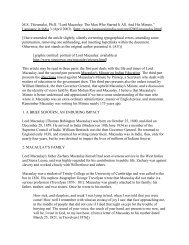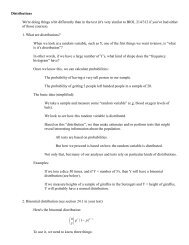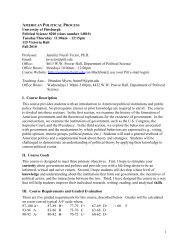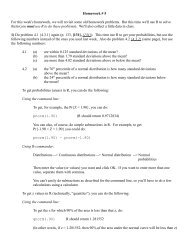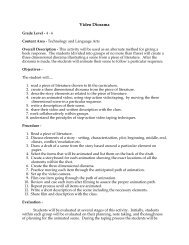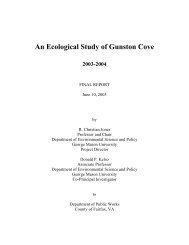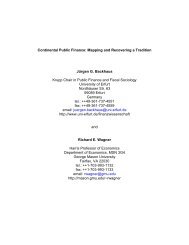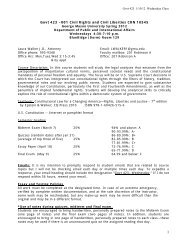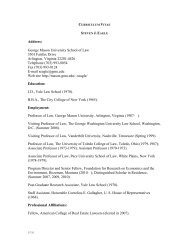"Pride and Prejudice in Pride and Prejudice" by Everett Zimmerman
"Pride and Prejudice in Pride and Prejudice" by Everett Zimmerman
"Pride and Prejudice in Pride and Prejudice" by Everett Zimmerman
Create successful ePaper yourself
Turn your PDF publications into a flip-book with our unique Google optimized e-Paper software.
70 N<strong>in</strong>eteenth-Century Fiction<br />
As the plot develops, avoid<strong>in</strong>g clashes, judgments, <strong>and</strong> resolu-<br />
tions becomes more <strong>and</strong> more difficult. Near the end of Book I1<br />
the theme of the Netherfield conversation reappears, but the<br />
movement of the conversation is quite changed. There is a dis-<br />
cernible direction to it, <strong>and</strong> it leads to a formulation (225-<br />
226). Elizabeth is tell<strong>in</strong>g Jane of her changed op<strong>in</strong>ions of Wick-<br />
ham <strong>and</strong> Darcy. She comments ironically on Jane's characteristic<br />
attempts to excuse both, <strong>and</strong> on her own treatment of Darcy:<br />
And yet I meant to be uncommonly clever <strong>in</strong> tak<strong>in</strong>g so decided a dis-<br />
like to him, without any reason. It is such a spur to one's genius, such<br />
an open<strong>in</strong>g for wit to have a dislike of that k<strong>in</strong>d. One may be cont<strong>in</strong>-<br />
ually abusive without say<strong>in</strong>g anyth<strong>in</strong>g just; but one cannot be always<br />
laugh<strong>in</strong>g at a man without now <strong>and</strong> then stumbl<strong>in</strong>g on someth<strong>in</strong>g witty<br />
(226).<br />
She recognizes here that she has laughed at what is good, despite<br />
what she had previously said to Darcy; however, the recognition<br />
is detached, shorn of any visible feel<strong>in</strong>g. But when Jane asks<br />
specifically about her feel<strong>in</strong>gs when she received Darcy's letter,<br />
Elizabeth replies, "I was uncomfortable enough. I was very un-<br />
comfortable" (226). And <strong>in</strong>stead of retreat<strong>in</strong>g from the moral<br />
evaluation toward which the conversation tends, she states it di-<br />
rectly: "But the misfortune of speak<strong>in</strong>g with bitterness, is a most<br />
natural consequence of the prejudices I had been encourag<strong>in</strong>g"<br />
(226). The conversation probes for <strong>and</strong> f<strong>in</strong>ds an attitude; it does<br />
not, like the earlier ones, kaleidoscopically shift all attitudes.<br />
Jane Austen's technique is functional: it suggests both the com-<br />
plexity of Elizabeth's world <strong>and</strong> her <strong>in</strong>ner moral development.<br />
The reductions of pride <strong>and</strong> prejudice always cause grief, <strong>and</strong><br />
Elizabeth learns to recognize <strong>and</strong> overcome the limitations of hu-<br />
man vision which threaten her happ<strong>in</strong>ess. Early <strong>in</strong> the book her<br />
attitude is frequently the ironic one characteristic of her father.<br />
She shares his appreciation of Mr. Coll<strong>in</strong>s' absurdity; Sir Wil-<br />
liam Lucas's servile behavior to Lady Cather<strong>in</strong>e is "high diver-<br />
sion" to her (159); <strong>and</strong> her division of characters <strong>in</strong>to simple<br />
<strong>and</strong> complex onesg reveals a detached attitude toward human<br />
be<strong>in</strong>gs <strong>and</strong> an avoidance of any moral judgment. In her reactions<br />
toward Darcy, she resembles her mother. Darcy's harsh, although<br />
justified, comments on the Bennet family <strong>in</strong>flame Elizabeth's preju-<br />
See Mudrick's analysis of this division,pp. 94-95.



